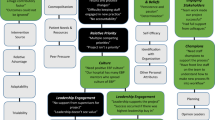Abstract
The US government funds integrated care demonstration projects to decrease health disparities for individuals with serious mental illness. Drawing on the Exploration Preparation Implementation Sustainability (EPIS) implementation framework, this case study of a community mental health clinic describes implementation barriers and sustainability challenges with grant-funded integrated care. Findings demonstrate that integrated care practices evolve during implementation and the following factors influenced sustainability: workforce rigidity, intervention clarity, policy and funding congruence between the agency and state/federal regulations, on-going support and training in practice application, and professional institutions. Implementation strategies for primary care integration within CMHCs include creating a flexible workforce, shared definition of integrated care, policy and funding congruence, and on-going support and training.

Similar content being viewed by others
References
Horvitz-Lennon, M., Kilbourne, A., Pincus, H. From silos to bridges: Meeting the general health care needs of adults with severe mental illness. Health Affairs. 2006; 25(3): 659–669.
Parks, J., Svendensen, D., Singer, P. et al Morbidity and mortality in people with serious mental illness. Alexandria VA: National Association of State Mental Health Program Directors. 2006. Available on line at https://www.nasmhpd.org/sites/default/files/Mortality%20and%20Morbidity%20Final%20Report%208.18.08.pdf Accessed on January 11, 2019
Druss, B. G., Zhao, L., Von Esenwein, S., et al. Understanding excess mortality in persons with mental illness: 17-Year follow up of a nationally representative US survey. Medical Care. 2011; 49(6): 599–604.
Croft, B., Parish, S. Care integration in the Patient Protection and Affordable Care Act: Implications for behavioral health. Administration and Policy in Mental Health and Mental Health Services Research, 2013; 40: 258–263.
Patient Protection and Affordable Care Act, 42 U.S.C. §18001 (2010).
Ader, J., Stille, C., Keller, D., et al. The medical home and integrated behavioral health: Advancing the policy agenda. Pediatrics. 2015; 135(5): 909–917.
Carey, T., Crotty, K., Morrissey, J., et al. Future research needs for evaluating the integration of mental health and substance abuse treatment with primary care. Journal of Psychiatric Practice. 2013; 19(5): 345–359.
Druss, B., Rohrbaugh, R., Levinson, C., et al. Integrated Medical care for patients with serious psychiatric illness. Archives of General Psychiatry. 2001; 58: 861–868.
Druss, B., von Esenwein, S.; Compton, M. et al. A randomized trial of medical care management for community mental health settings: The Primary Care Access, Referral, and Evaluation (PCARE) study. American Journal of Psychiatry. 2010; 167: 151–157.
Vanderlip, E., Henwood, B., Hrouda, D., et al. Systematic Literature review of general health care interventions within programs of assertive community treatment. Psychiatric Services. 2017; 68(3), 218–224.
Aarons, G. A., Hurlburt, M., & Horwitz, S. M. Advancing a conceptual model of evidence-based practice implementation in public service sectors. Administration and Policy in Mental Health and Mental Health Services Research. 2011; 38(1): 4–23. Doi: https://doi.org/10.1007/s10488-010-0327-7.
Miller, B., Ross, K., Davis, M. et al. Payment reform in the patient-centered medical home: Enabling and sustaining integrated behavioral health care. American Psychologist. 2017; 72(1): 55–68.
Kaiser Family Foundation (2013). Summary of the Affordable Care Act. behavioral health integrated care. Accessed on January 11, 2019.
Roosevelt, J., Burke, T., Jean, P. Commentary on Part I: Objectives of the ACA. In The Affordable Care Act as a National Experiment: Health Policy Innovations and Lessons. Ed. Selker, H. & Wasser, J. New York: Springer, 2014.
Center for Medicare and Medicaid Innovation. (n.d.) CMS (n.d.) Health care innovation awards. Available online at https://innovation.cms.gov/initiatives/Health-Care-Innovation-Awards/index.html. Accessed on January 11, 2019.
Bradford, D., Cunningham, N., Slubicki, M., et al. An evidence synthesis of care models to improve general medical outcomes for individuals with serious mental illness: A systematic review. Journal of Clinical Psychiatry.2013; 74(8): e754-e764.
Vanderlip, E., Williams, N., Fiedorowicz, J., et al. Exploring primary care activities in ACT Teams. Journal of Community Mental Health. 2014; 50: 466–473.
Manderscheild, R., Kathol, R. Fostering sustainable, integrated medical & behavioral health services in medical settings. Annals of Internal Medicine. 2014; 160(1): 61–66.
Brown Levey, S. M. B., Miller, B. F., deGruy, F. V.. Behavioral health integration: An essential element of population-based healthcare redesign. Translational Behavioral Medicin, 2012; 2(3): 364–371.
Fixsen, D. L., Naoom, S. F., Blasé, K. A., et al. Implementation research: A synthesis of the literature (FMHI Publication #231). Tampa: University of South Florida, Louis de la Parte Florida Mental Health Institute, The National Implementation Research Network. 2005. Available online at http://nirn.fpg.unc.edu/resources/implementation-research-synthesis-literature. Accessed January 11, 2019.
Bond, G., Drake, R., McHugo, G., et al. Long-term sustainability of evidence-based practices in community mental health agencies. Administrative Policy in Mental Health and Mental Health Services Research. 2014; 41: 228–236.
Willging, C., Lamphere, L., Rylko-Bauer, B. The transformation of behavioral healthcare in New Mexico. Administration and Policy in Mental Health and Mental Health Services Research. 2015; 42: 343–355. DOI https://doi.org/10.1007/s10488-014-0574-0
MacDonald, M., Pauly, B., Wong, G., et al. Supporting successful implementation of public health interventions: Protocol for a realist synthesis. Systematic Reviews, 2016; 5(54): 1–11.
Scheirer, M. A., Dearing, J. An agenda for research on the sustainability of public health programs. American Journal of Public Health. 2011; 101(11): 2059–2067.
Powell, B., Beidas, R. Advancing implementation research and practice in behavioral health systems. Administration and Policy in Mental Health and Mental Health Services Research. 2016; 43: 825–833.
Baskarada, S. Qualitative case study guidelines. The Qualitative Report. 2014; 19(24): 1–18.
Yin, Robert Case study research design and methods. Thousand Oaks: Sage Publications. 2014.
Gilgun, J. A case for case studies in social work research. Social Work. 1994; 39(4), 371–380.
Cresswell, J. Research design. Thousand Oaks: Sage Publications. 2014.
Palinkas, L. A., Horowitz, S., Green, C., et al. Purposeful sampling for qualitative data collection and analysis in mixed method implementation research. Administration and Policy in Mental Health and Mental Health Services Research, 2015; 42(5): 533–544. doi: https://doi.org/10.1007/s10488-013-0528-y
Patton, M. Q. Qualitative research & evaluation methods. Thousand Oaks: Sage Publications. 2002.
SAMHSA. Primary and behavioral health care integration grants. Available online at https://www.samhsa.gov/sites/default/files/programs_campaigns/samhsa_hrsa/pbhci-performance-profile.pdf. Accessed on January 11, 2019
Green, C., Duan, N., Gibbons, R., et al. Approaches to Mixed methods dissemination and implementation research: Methods, strengths, caveats, and opportunities. Administration and Policy in Mental Health and Mental Health Services Research, 2015; 42(5): 508–523.
Chaudoir, S., Dugan, A., Barr, C. Measuring factors affecting implementation of health innovations: a systematic review of structural, organizational, provider, patient and innovation level measures. Implementation Science. 2013; 8(22): 1–20.
Damanpour, F. Organizational innovation: A meta-analysis of effects of determinants and moderators. The Academy of Management Journal. 1991; 34(3), 555–590.
Damschroder, L., Aron, D., Keith, et al. Fostering implementation of health services research findings into practice: A consolidated framework for advancing implementation science. Implementation Science. 2009; 4(50): 1–15.
Durlak, J., DuPre, E. Implementation matters: A review of research on the influence of implementation on program outcomes and the factors affecting implementation. American Journal of Community Psychology. 2008; 41: 327–350.
Kauth, M., Sullivan, G., Cully, J., et al. Facilitating Practice changes in mental health clinics: A guide for implementation development in health care systems. Psychological Services. 2001; 8(1): 36–47.
Nielsen, K. How can we make organizational interventions work? Employees and line managers as actively crafting interventions. Human Relations. 2013; 66(8): 1029–1050.
Nilsen, P. Making sense of implementation theories, models and frameworks. Implementation Science. 2015; 10(53): 1–13.
Torrey, W., Drake, R., Dixon, L., et al. Implementing evidence-based practices for persons with severe mental illnesses. Psychiatric Services. 2001; 52(1): 45–50.
Gilgun, J. Beyond description to interpretation and theory in qualitative social work research. Qualitative Social Work. 2015; 14(6): 741–752.
Miles, M., Huberman, A. M., Saldaña, J. Qualitative data analysis: A methods sourcebook. Thousand Oaks: Sage Publications. 2014.
Saldaña, J. The coding manual for qualitative researchers. Thousand Oaks, CA: Sage Publications. 2016.
Please see SAMHSA website for more information on each EBP: https://www.samhsa.gov/ebp-resource-center. Accessed 28 June 2019.
Norsen, L, Opladen, J., Quinn, J. Practice model: Collaborative practice. Critical Care Nursing Clinics North America. 1995; 7: 43–52.
Hall, P. Interprofessional teamwork: Professional cultures as barriers. Journal of Interprofessional Care. 2005; 19: 188–196.
Hall, J., Cohen, D., Davis, M., et al. Preparing the Workforce for behavioral health and primary care integration. Journal of the American Board of Family Medicine. 2015; 28(5): S41-S51.
Weller, J., Boyd, M., Cumin, D. Teams, tribes and patient safety: Overcoming barriers to effective teamwork in healthcare. Postgraduate Medical Journal. 2014; 90: 149–154.
MacDonald, J., Jayasuriya, R., Harris, M. The influence of power dynamics and trust on multidisciplinary collaboration: A qualitative case study of type 2 diabetes mellitus. Heath Services Research. 2012; 12: 63.
Gittell, J., Weinberg, D., Pfefferle, S., et al. Impact of relational coordination on job satisfaction and quality outcomes: a study of nursing homes. Human Resource Management Journal. 2008; 18(2): 154–170.
McDermott, A., Conway, E., Cafferkey, K. et al. Performance management in context: formative cross-functional performance monitoring for improvement and the mediating role of relational coordination in hospitals. The International Journal of Human Resource Management. 2019; 30(3): 436–456.
Goodwin, N. Understanding integrated care. International Journal of Integrated Care. 2016; 16(4): 1–4.
Ignatowicz, A., Greenfield, G., Pappas, Y., et al. Achieving provider engagement: Providers’ perceptions of implementing and delivering integrated care. Qualitative Health Research. 2014; 24(12): 1711–1720.
Beidas, R., Edmunds, J., Ditty, M., et al. Are inner context factors related to implementation outcomes in cognitive-behavioral therapy for youth anxiety? Administrative Policy and Mental Health and Mental Health Services. 2014; 41: 788–799.
Fraser, M., Lombardi, B., Wu, S., et al. Integrated primary care and social work: A systematic review. Journal of the Society for Social Work and Research. 2018; 9(2): 175–215.
Funding
This work was funded by the National Institute of Health (TL1TR000422). The methods, observations, and interpretations put forth in this article do not necessarily represent those of the funding agency. The author would like to thank Jean Kruzich, Gunnar Almgren, and Larry Kessler for their guidance in this research project and Kitsap Mental Health Services for partnering on this research adventure.
Author information
Authors and Affiliations
Corresponding author
Ethics declarations
Informed consent
was obtained from all interview participants and a selection of the outpatient team. The Human Subjects Division within the University of Washington approved this study #50280.
Conflict of Interest
The author declares no conflict of interest.
Additional information
Publisher’s Note
Springer Nature remains neutral with regard to jurisdictional claims in published maps and institutional affiliations.
Rights and permissions
About this article
Cite this article
Aby, M. A Case Study of Implementing Grant-Funded Integrated Care in a Community Mental Health Center. J Behav Health Serv Res 47, 293–308 (2020). https://doi.org/10.1007/s11414-019-09671-7
Published:
Issue Date:
DOI: https://doi.org/10.1007/s11414-019-09671-7



